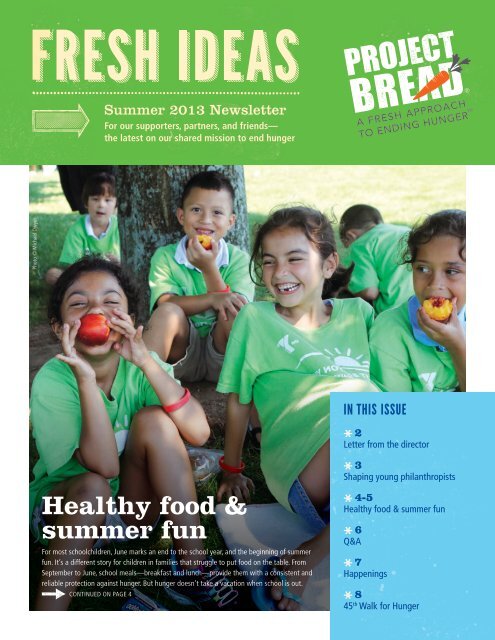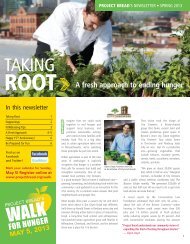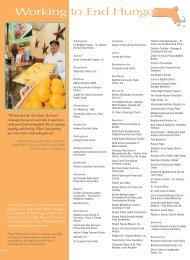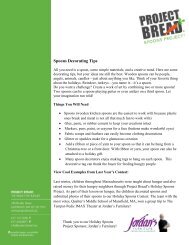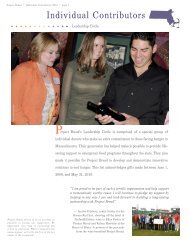Healthy food & summer fun
Summer 2013 Newsletter - Project Bread
Summer 2013 Newsletter - Project Bread
- No tags were found...
You also want an ePaper? Increase the reach of your titles
YUMPU automatically turns print PDFs into web optimized ePapers that Google loves.
Summer 2013 Newsletter<br />
For our supporters, partners, and friends––<br />
the latest on our shared mission to end hunger<br />
®<br />
SM<br />
Photo © Michael Dwyer<br />
IN THIS iSSUE<br />
2<br />
Letter from the director<br />
<strong>Healthy</strong> <strong>food</strong> &<br />
<strong>summer</strong> <strong>fun</strong><br />
For most schoolchildren, June marks an end to the school year, and the beginning of <strong>summer</strong><br />
<strong>fun</strong>. It’s a different story for children in families that struggle to put <strong>food</strong> on the table. From<br />
September to June, school meals—breakfast and lunch—provide them with a consistent and<br />
reliable protection against hunger. But hunger doesn’t take a vacation when school is out.<br />
Continued on page 4<br />
3<br />
Shaping young philanthropists<br />
4-5<br />
<strong>Healthy</strong> <strong>food</strong> & <strong>summer</strong> <strong>fun</strong><br />
6<br />
Q&A<br />
7<br />
Happenings<br />
8<br />
45 th Walk for Hunger
Photo © Michael Dwyer<br />
Letter from<br />
THE DIRECTOR<br />
Dear Friends:<br />
Project Bread is always evolving. Through research, listening, and creative<br />
thinking, we are discovering and developing new ways to address and<br />
prevent hunger in our state. And to better communicate our vision, goals,<br />
and passion to all of you, we’ve also been working behind the scenes to<br />
develop a new look and feel for Project Bread.<br />
Our new graphic identity is inspired by our grassroots beginnings,<br />
highlights our focus on healthy solutions, and captures through the<br />
boldness of the type and the angle of the composition the energy and<br />
drive of our staff—and of all of you who propel our shared mission.<br />
Project Bread’s new tagline—”a fresh approach to ending hunger”––<br />
speaks to the range of our innovative programs: from emergency meal<br />
solutions, to early childhood health initiatives, to local and sustainable<br />
<strong>food</strong> resources.<br />
That sound when you bite into a really crisp, fresh carrot, straight from the<br />
garden? That’s what we want to bring to this work. Which is why…<br />
We bring a fresh understanding to the problem of<br />
hunger. We view it as a complex problem, and recognize that one<br />
antihunger solution does not fit all. We listen carefully to the voices and<br />
insights of people who have experienced <strong>food</strong> insecurity, and go on to<br />
create solutions that are responsive to their sense of personal dignity,<br />
and reflective of their concerns.<br />
We take a fresh approach to partnerships. We’re<br />
passionate about including local producers and farmers in our initiatives<br />
because we understand that hunger is a problem that exists within the<br />
<strong>food</strong> system—not outside of it. We can support local business, reduce our<br />
environmental impact, promote sustainable activity, and give our families<br />
healthy <strong>food</strong> as a result of these partnerships.<br />
We stand up for fresh <strong>food</strong>, good cooking, and<br />
community life. Good <strong>food</strong> connects us, gives us joy, and makes us<br />
healthy. We illustrate this in our lead article about <strong>summer</strong> meals and the<br />
importance of relationship-building and mentoring in this first edition of<br />
our newly expanded newsletter. The motto of the Cops N Kids program<br />
in Southbridge is “you have the right to a healthy and active life.”<br />
We couldn’t agree more.<br />
And we’re taking a fresh approach to including you,<br />
our supporters, in our work and thinking. Many of you<br />
know the Walk, of course, but you may not know as much about our<br />
newer programs, or some of the great partners we’re working with now,<br />
or how you can become involved in our efforts, year-round. Through this<br />
expanded, re-designed newsletter and other communications, we want to<br />
make sure that you’re up to date on all of our fresh approaches. We can’t<br />
bring them to life without you!<br />
Thank you for joining Project Bread in changing the lives of families and<br />
communities around the state.<br />
Sincerely,<br />
Ellen Parker<br />
Executive Director<br />
The Walk for Hunger<br />
Still have pledges outstanding?<br />
Ask your sponsors for the <strong>fun</strong>ds and they will be<br />
impressed by your commitment.<br />
Or donate at www.projectbread.org.<br />
We still need your help!<br />
®<br />
SM<br />
2 | www.projectbread.org
Shaping young<br />
philanthropists<br />
Armed with Yadoff ’s lessons, Nusbaum<br />
successfully raised $360—and was<br />
so thrilled that he could do all 20<br />
miles, he actually ran the last mile of<br />
the Walk. Like Nusbaum, his fellow<br />
students took what they’d learned out<br />
into the community, and enlisted the<br />
support of family and friends to work<br />
toward their <strong>fun</strong>draising goals. Between<br />
soliciting pledges, running bake sales,<br />
and launching a range of other crafty<br />
<strong>fun</strong>draisers, Jamie’s students raised<br />
a significant amount of money for<br />
families in need.<br />
One of the group’s most notable<br />
<strong>fun</strong>draising methods involved shoveling<br />
snow for donations. Before February’s<br />
big blizzard, they went door-to-door in<br />
their Brookline neighborhood asking<br />
for donations in return for shoveling—a<br />
pitch that resulted in more than a<br />
thousand dollars raised for Project Bread!<br />
Some of the 90 students from the 2013 “We Have Pierce Pride” team from the John Pierce Middle School<br />
in Brookline. Cumulatively, they raised $35,000, second only to Arbella Insurance Group, and 25 became<br />
members of Project Bread’s Heart & Sole Circle. Photo courtesy of parent volunteer.<br />
When a middle school student discovers<br />
something is unfair, he or she will<br />
go the distance to fix that injustice,<br />
according to teacher Jamie Yadoff.<br />
“Seventh and eighth graders are at an<br />
age where everything is about fairness,”<br />
she explains from her seventh grade<br />
classroom at John Pierce Middle<br />
School in Brookline. “My students<br />
recognize it’s not fair that kids their<br />
age are hungry—and that they can do<br />
something about it. All you have to do<br />
is present the problem and the kids<br />
want to find the solution.”<br />
One of those solutions was signing<br />
up for the 2013 Walk for Hunger,<br />
and raising more than $35,000 for<br />
community <strong>food</strong> programs across<br />
Massachusetts. Now in her eighth<br />
year of leading the “We Have Pierce<br />
Pride” team of students, Yadoff has<br />
helped more than 500 students raise<br />
approximately $150,000—a truly<br />
extraordinary amount of money!<br />
Yadoff ’s unique teaching methods<br />
make civic responsibility and hunger<br />
a part of the classroom discussion<br />
year-round: she conveys the basic<br />
idea of social injustice, provides daily<br />
hunger facts, checks in on how her<br />
students feel before lunch to illustrate<br />
the reality of hunger, and gives all of<br />
her students talking points to use when<br />
asking others to support their Walk.<br />
Her holistic approach to teaching<br />
students about hunger is a model that<br />
Project Bread hopes to introduce to<br />
other schools around the state, in an<br />
effort to encourage philanthropy and<br />
community service in young people.<br />
“Although I am a child, I have learned<br />
a lot about hunger,” wrote Spencer<br />
Nusbaum on his Walk webpage. “I have<br />
so much <strong>food</strong> and I would like to give it<br />
away to those in need, but I don’t know<br />
how. That is why I registered for The<br />
Walk for Hunger.”<br />
Although this is the first time many<br />
of these students have raised <strong>fun</strong>ds,<br />
their goals are becoming progressively<br />
more ambitious. This year, 25 students in<br />
Yadoff ’s 90-member Walk team made it<br />
to the Heart & Sole Circle, raising more<br />
than $500! Five of her students went even<br />
further and raised more than $1,000 to<br />
join the Leadership Circle, including the<br />
team’s highest <strong>fun</strong>draiser, Tailo Chow,<br />
who exceeded his goal of $3,000 by more<br />
than $870.<br />
“My students want to change the world,<br />
and the Walk is a way for them to have<br />
a voice—a beautiful thing for me to see<br />
as a teacher,” says Yadoff.<br />
You can still donate to the team at<br />
www.projectbread.org/wehavepiercepride<br />
www.projectbread.org | 3
Continued from front cover<br />
<strong>Healthy</strong> <strong>food</strong> &<br />
<strong>summer</strong> <strong>fun</strong><br />
Photo courtesy of Summer UP<br />
We know that every child needs healthy <strong>food</strong> every day to learn and thrive.<br />
That’s why Project Bread works so hard with our community partners and<br />
state policy makers to boost, strengthen, and expand the Summer Food<br />
Service Program (SFSP), a federally supported child nutrition program,<br />
which was specifically designed to bridge the <strong>summer</strong> gap in school meals.<br />
Summer Up participants Prinya Sommala-Dobson,<br />
Caroline Marcelino, Jacqueline Vera, and Jeremias<br />
Sanchez sit on the summit of Wachusett Mountain<br />
in Princeton, Massachusetts, with staff member<br />
Victor Rojas (far right) while on a field trip with<br />
the program.<br />
The SFSP is a robust source of help for<br />
vulnerable Massachusetts schoolchildren.<br />
Last year, an average of 50,000 students<br />
enjoyed a healthy breakfast, lunch,<br />
snack, or dinner at one of the nearly<br />
900 <strong>summer</strong> meal sites in schools, parks,<br />
public pools, neighborhood centers,<br />
and other program locations across the<br />
state. Over the course of last <strong>summer</strong>,<br />
nearly 2.6 million meals were served—<br />
providing schoolchildren with the boost<br />
in health and energy they need as they<br />
swing back to school in September.<br />
According to Ellen Parker, the executive<br />
director of Project Bread, “The best<br />
<strong>summer</strong> meals programs lead with<br />
great activities that attract children.<br />
Children want to attend programs that<br />
are <strong>fun</strong> and offer them dignity. If a<br />
meals program has the feel of a charity<br />
handout, it’s not building the healthy<br />
self-esteem that children need to thrive<br />
and succeed.”<br />
Project Bread provides <strong>fun</strong>ds at the<br />
community level to expand and enrich<br />
<strong>summer</strong> meals programs that get<br />
children engaged and keep them coming<br />
back for more. The basic program<br />
provides a healthy meal—but it’s the<br />
extras like physical activity, arts, and<br />
educational lessons that create a holistic<br />
experience for vulnerable children, and,<br />
at the same time, generate social capital<br />
and build community.<br />
We highlight two innovative and<br />
effective programs that illustrate<br />
this approach: Mount Wachusett<br />
Community College’s Summer UP<br />
program, which operates at sites in<br />
Fitchburg, Gardner, and Leominster,<br />
and the Cops N Kids Nutrition<br />
Academy in Southbridge.<br />
Summer UP<br />
Mount Wachusett Community College<br />
engages both older and younger<br />
students using two distinct strategies.<br />
Keeping the focus on very low-income<br />
communities, the program invites<br />
younger children to participate in<br />
meaningful community projects—and,<br />
at the same time, to enjoy healthy meals.<br />
The college brings in older students by<br />
offering them the opportunity to apply<br />
for paid <strong>summer</strong> camp counselor jobs.<br />
Once hired, the teens act as mentors to<br />
the younger children participating in<br />
the program.<br />
4 | www.projectbread.org
Older teens are a key group at risk for<br />
hunger in the <strong>summer</strong>, and they can be<br />
hard to attract. Mount Wachusett shifts<br />
that narrative. Upon being hired for<br />
the <strong>summer</strong>, teens are highly motivated<br />
to stay—eating healthy meals as “staff,”<br />
rather than as “students.”<br />
The teen counselors primarily lead<br />
culture-focused projects, such as<br />
engaging the students in an arts and<br />
crafts assignment to create a flag<br />
from their country of origin, sharing<br />
traditions the students practice at<br />
home, and exploring how <strong>food</strong> plays<br />
an important role in their cultural and<br />
family traditions.<br />
“Being a part of Summer Up is a great<br />
experience,” Feven Merid tells us. She<br />
participated in one of the program sites<br />
in 2011 while attending Leominster<br />
High School. “We eat healthy <strong>food</strong> every<br />
day, and get paid to have <strong>fun</strong>. As a staff<br />
member,” continues Merid, “I’ve been<br />
able to build a lot of skills through my<br />
interaction with the kids, including<br />
effective communication and active<br />
listening. I have a great time with them—<br />
and it feels good to be a role model.”<br />
Probation Officer Candido Diaz of the Worcester<br />
Juvenile Court, Dudley Session, cuts apple slices<br />
for students like Jorge Marrero at the “hydration<br />
center” of the Southbridge Cops N Kids <strong>summer</strong><br />
meal site. Participants have access to cold water<br />
and fresh fruit throughout the day.<br />
Staff photo<br />
Last year, the Summer UP program<br />
brought its mentoring program to the<br />
Spanish American Center’s Summer<br />
Youth Program in Leominster, called<br />
“Verano Alegre” or “Summer Fun.”<br />
This multicultural program serves<br />
100 low-income children and provides<br />
meals for another 200 students at sites<br />
in Gardner and Fitchburg.<br />
Cops N Kids<br />
Cops N Kids in Southbridge is another<br />
great example of good <strong>food</strong> mixed<br />
with good <strong>fun</strong>. Cops N Kids first<br />
began in Southbridge as a way to forge<br />
relationships between law enforcement<br />
officers and local young people.<br />
However, the community’s families<br />
had other needs too: 70 percent of the<br />
students receive free or reduced-price<br />
meals during the school year.<br />
Seven years ago, Project Bread made<br />
the match between Cops N Kids and<br />
the Summer Food Service Program, and<br />
now local young people have a great<br />
place to hang out—and a valuable <strong>food</strong><br />
resource—all <strong>summer</strong> long.<br />
Last year, this six-week program<br />
was expanded into the Cops N Kids<br />
Nutrition Academy—an initiative<br />
described not as a “Boot Camp,”<br />
but as a “Food Camp.” Students<br />
participate in physical activities such<br />
as basketball, hiking, and kayaking, as<br />
well as educational classes. Building on<br />
its athletic programming, and crime<br />
prevention, safety, and life skill classes,<br />
the Academy teaches healthy eating and<br />
exercising as part of its motto: “you have<br />
the right to a healthy and active life.”<br />
Early on in the program, students get<br />
an introduction to growing vegetables<br />
at the community center, where they<br />
are responsible for nurturing peppers,<br />
tomatoes, and squash—ingredients<br />
that will later become a veggie<br />
pizza they will enjoy. The program<br />
incorporates ten different modules<br />
focusing on nutrition and physical<br />
activity, including Food Camp, Farm<br />
Staff photo<br />
Project Bread invests in Southbridge’s Cops N Kids<br />
<strong>summer</strong> program, which promotes healthy eating<br />
and physical activity.<br />
Visit, and Food Crime Scene—a course<br />
that positions the students as detectives<br />
in charge of solving a <strong>food</strong> mystery.<br />
They use crime scene investigation and<br />
forensic techniques taught by the police<br />
officers to solve the case.<br />
“I believe the Cops N Kids program<br />
will not only teach our children to eat<br />
healthier, but it will also instill healthier<br />
habits of drinking and playing too,”<br />
said Police Sergeant Jose Dingui.<br />
“This is a win all around,” said Ellen<br />
Parker of Project Bread. “Each of these<br />
programs, Summer UP and Cops<br />
N Kids, draws on the strength and<br />
vibrancy of local communities. Project<br />
Bread invests in programs like these<br />
because we understand that healthy<br />
children and healthy communities are<br />
mutually reinforcing.”<br />
By investing in these programs, Project<br />
Bread makes it possible for low-income<br />
children to eat well, stay active, build<br />
friendships, and return to school ready<br />
to do their best.<br />
If you would like to learn more about<br />
Summer Food Service Program sites near<br />
you, call Project Bread’s FoodSource Hotline<br />
at 1-800-645-8333.<br />
www.projectbread.org | 5
Brandy Brooks<br />
As the Greater Boston Regional Director of The Food Project, Brandy<br />
Brooks has directed community-based programs since 2011. She is a highly<br />
effective manager, a pioneering thinker, and an activist of great heart.<br />
Project Bread is an enthusiastic and long-time supporter of The Food Project.<br />
Tell us about The Food Project.<br />
Our tagline is “youth, <strong>food</strong>, and community.”<br />
We bring young people from urban and<br />
suburban communities to work together and<br />
grow <strong>food</strong> on each of our four farms. This fresh<br />
<strong>food</strong>—over 250,000 pounds annually—goes<br />
out to the communities we work in through<br />
farmers’ markets, Community Supported<br />
Agriculture (CSA) programs, and local <strong>food</strong><br />
pantries. The hallmark of our program is our<br />
focus on identifying and transforming a new<br />
generation of leaders by placing youth in highly<br />
responsible roles with deeply meaningful work.<br />
Staff photo<br />
How is your work different from<br />
other antihunger programs?<br />
One of the things that I love about working<br />
at The Food Project is that we help people get<br />
their hands in the dirt and actually produce and<br />
“Hunger exists within our broader <strong>food</strong> system—<br />
the real question is how do we fix the system so<br />
it no longer produces hunger but instead it’s the<br />
foundation for fair and equal access to healthy<br />
<strong>food</strong> for everyone?”<br />
grow <strong>food</strong>. People who interact with us are not<br />
just recipients of services, they are active agents<br />
of community change.<br />
The traditional antihunger model of <strong>food</strong><br />
distribution can provide immediate and<br />
important help, but it doesn’t solve the<br />
problem. Hunger exists within our broader<br />
<strong>food</strong> system—the real question is how do we<br />
fix the system so it no longer produces hunger<br />
but instead it’s the foundation for fair and<br />
equal access to healthy <strong>food</strong> for everyone?<br />
What is the most inspiring part<br />
of working with youth?<br />
The opportunity and responsibility to grow<br />
and distribute <strong>food</strong>, and address a very real<br />
and basic community need, is work that really<br />
changes people. Seeing young people step<br />
into the fullness of who they are, and feel<br />
comfortable doing that, is great and always<br />
lifts me up.<br />
Brandy H. M. Brooks, Greater Boston Regional Director<br />
of The Food Project, in the Dudley Greenhouse.<br />
Food, cooking, and community—<br />
how does this mix build social<br />
capital?<br />
This is actually one of the reasons that I got<br />
involved with The Food Project. Food is so basic<br />
to humanity and it ends up touching every<br />
aspect of human life. Whole cultures are built<br />
around <strong>food</strong> traditions and <strong>food</strong> taboos.<br />
Food is really a defining way that people relate<br />
to one another so it is an incredibly powerful<br />
tool for building social capital. One of the<br />
reasons we bring in youth around <strong>food</strong> is<br />
because it provides that common platform for<br />
them to be able to explore differences in race,<br />
culture, and geography. These are conversations<br />
that are incredibly difficult for people to have<br />
without that common ground.<br />
6 | www.projectbread.org
Happenings<br />
Chefs in Head Start<br />
Chef Educator Vanessa LaBranche led a<br />
cooking demonstration for Lynn Mayor<br />
Judith Flanagan Kennedy (second right), Tim<br />
O’Brien, Sr. VP, from <strong>fun</strong>der Blue Cross Blue<br />
Shield of Massachusetts (second left), Ellen<br />
Parker (right), and elected officials to highlight<br />
Project Bread’s Chefs in Head Start program<br />
at Lynn Economic Opportunity Inc. (LEO). The<br />
initiative teaches very young children healthy<br />
eating habits, and promotes healthy cooking<br />
at school and home.<br />
Blue Ginger<br />
In June, Project Bread held a cocktail reception<br />
for donors at Ming Tsai’s Blue Ginger<br />
restaurant in Wellesley. Ellen Parker, executive<br />
director, and Scott Richardson, director of<br />
research and special initiatives, discussed<br />
innovative, local, and sustainable solutions to<br />
ending hunger in Massachusetts.<br />
Breakfast Winner<br />
Why should YOU eat a healthy breakfast? Lyba<br />
Khan asked this question of fellow students at<br />
Revere High School. The resulting 30-second<br />
video won the third annual school breakfast<br />
video contest hosted by Project Bread and the<br />
Massachusetts Department of Elementary and<br />
Secondary Education, and will be featured on<br />
WHDH-TV. Congratulations!<br />
Photo © Joshua Touster<br />
Photo © Joshua Touster<br />
Text 4 Food<br />
Know a text-savvy teen looking for a free<br />
meal this <strong>summer</strong>? Direct him or her to Project<br />
Bread’s Text 4 Food program starting July 1.<br />
The statewide outreach campaign, geared at<br />
reaching teens through their mobile phones,<br />
directs them to a free lunch at the nearest open<br />
Summer Food Service Program, complete with<br />
location and times. Just text 617-863-6325.<br />
School Cookbook<br />
With inspiration from Project Bread’s Chefs in<br />
Schools, and school <strong>food</strong> professionals from<br />
across the state, Project Bread is creating a<br />
cookbook that will help kitchen staff make<br />
healthy meals that kids like to eat. From turkeypineapple<br />
stirfry to vegetarian chili, the new<br />
cookbook will make it easy and inexpensive to<br />
meet the new USDA nutrition requirements.<br />
Be a BreadWinner!<br />
Calling all annual donors! BreadWinners—<br />
our monthly giving program—is a convenient<br />
way to make a big difference in the lives<br />
of hungry people. By pre-authorizing your<br />
bank or your credit card to send a gift each<br />
month, you help us serve families in need<br />
all year round. To enroll, please visit<br />
www.projectbread.org/breadwinners.<br />
www.projectbread.org | 7
Summer 2013 Newsletter<br />
®<br />
SM<br />
Nonprofit<br />
Organization<br />
U.S. Postage<br />
PAID<br />
Leominster, MA<br />
Permit No. 17<br />
145 Border Street, East Boston, MA 02128-1903<br />
DONATE NOW<br />
Please help us meet the needs of the increasing numbers of hungry<br />
families by giving the most generous gift you can today.<br />
Every dollar counts.<br />
You make our vital work possible, and you play a critical role in our<br />
mission to alleviate, prevent, and ultimately end hunger in Massachusetts.<br />
DONATE NOW AT WWW.PROJECTBREAD.ORG<br />
Photo © David Leifer<br />
45 th Walk for Hunger<br />
“Thank you” to all of The Walk for Hunger’s<br />
corporate sponsors for a great Walk! Not<br />
only were corporate sponsors successful with<br />
team organizing and <strong>fun</strong>draising, but they<br />
were also creative. For example, Freihofer’s<br />
Baking Company organized a bowling night<br />
that netted $3,500 and matched team<br />
<strong>fun</strong>draising, while Kettle Cuisine hosted parties<br />
at employees’ homes and raised nearly $1,600.<br />
Arbella Insurance Group double-matched their<br />
employees’ personal contributions in honor of<br />
the company’s 25th anniversary, and for the<br />
first time, Bay State Milling matched employee<br />
<strong>fun</strong>draising and offered walking opportunities<br />
to staff during work hours. Citizens Bank more<br />
than doubled the size of its team, and Raytheon<br />
increased outreach via Twitter. We recognize and<br />
appreciate the effort that all of our corporate<br />
sponsors put in the Walk each year!<br />
Recycled Paper Using Soy Inks


